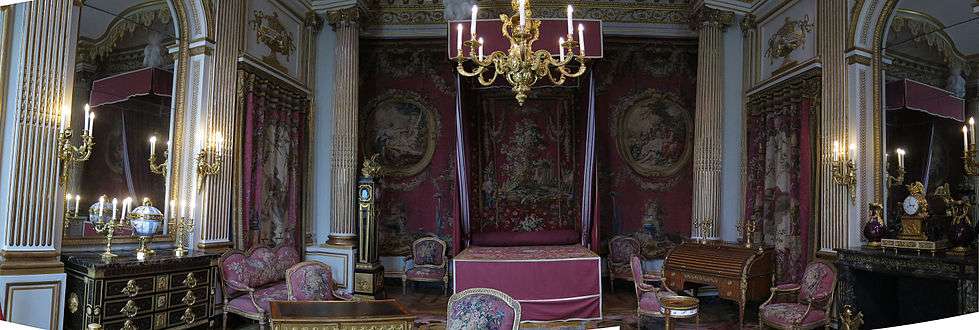Hôtel de Chevreuse
The former Hôtel de Chevreuse (later known as the Hôtel de Luynes) was a Parisian hôtel particulier located at 33 Rue Saint-Dominique (on a site that now includes part of the Boulevard Saint-Germain), just south of the Église Saint-Thomas-d'Aquin.[1]
.jpg)
History
The Hôtel de Chevreuse was constructed in 1660 for Marie de Rohan, Duchess of Chevreuse, by the architect Pierre Le Muet,[2] whose designs were engraved by Jean Marot and published in the Grand Marot in 1686.[3] Le Muet's hôtel was in the traditional French style, between court and garden.
_BnF_RES-V-371_034r-f75_H%C3%B4tel_de_Chevreuse_au_faubourg_Saint-Germain%2C_Plan_(adjusted).jpg) Plan of the ground floor
Plan of the ground floor_BnF_RES-V-371_035r-f77_H%C3%B4tel_de_Chevreuse_au_faubourg_Saint-Germain%2C_Plan_du_premier_%C3%A9tage_(adjusted).jpg) Plan of the main floor
Plan of the main floor_BnF_RES-V-371_037r-f81_H%C3%B4tel_de_Chevreuse_au_faubourg_Saint-Germain%2C_Face_du_c%C3%B4t%C3%A9_de_la_cour_avec_ses_profils_des_ailes_(adjusted).jpg) Court facade of the corps de logis
Court facade of the corps de logis_BnF_RES-V-371_036r-f79_H%C3%B4tel_de_Chevreuse_au_faubourg_Saint-Germain%2C_Profil_du_c%C3%B4t%C3%A9_de_la_cour_(adjusted).jpg) Transverse section of the corps de logis and elevation of the court facade of the west wing
Transverse section of the corps de logis and elevation of the court facade of the west wing
In 1670, the granddaughter of Marie de Rohan, Jeanne Baptiste d'Albert, was born at the Hôtel de Chevreuse. Upon Marie de Rohan's death in 1679, the house passed to Jeanne-Baptiste's father, Louis Charles d'Albert, Duke of Luynes, Marie de Rohan's son from her first marriage.[4]
In 1747 the Italian painter Paolo Antonio Brunetti decorated the grand staircase with wall paintings depicting figures in a simulated architecture.[5] These paintings can still be viewed in the Luynes Staircase at the Musée Carnavalet.
The apartment of Charles Louis d'Albert de Luynes, Duke of Chevreuse and Governor of Paris, was remodeled in 1767 by Pierre-Louis Moreau-Desproux. His boiserie and fireplace from the former chambre de parade of the Duke of Chevreuse was bequeathed in 1962 to the Musée du Louvre by the widow of the French industrialist Pierre Lebaudy and was refurbished and reinstalled in the Department of Decorative Arts in 2013.[6][7]
The hôtel was partly destroyed in 1868, during the creation of the Boulevard Saint-Germain. The remaining sections were demolished in 1900 to make way for the Rue de Luynes and the Boulevard Raspail.[6][7][8]
Image gallery
- The Luynes Staircase at the Musée Carnavalet
 Chambre de parade of the Duke of Chevreuse at the Louvre
Chambre de parade of the Duke of Chevreuse at the Louvre Panorama of the chambre de parade
Panorama of the chambre de parade
Notes
- Sellier 1900; Mignot 1996, p. 145.
- Mignot 1996, p. 145; Sellier 1900, p. 3.
- Deutsch 2015, pp. 459, 462–463.
- Sellier 1900, p. 5.
- Benezit 2006, vol. 2, p. 1382; Gady 2012.
- Gady 2012.
- "Salle Lebaudy" at the Atlas database of the Louvre.
- Mignot 1996, p. 145.
Bibliography
- Benezit (2006). Benezit Dictionary of Artists. Paris: Gründ. ISBN 9782700030709. Also at Oxford Art Online.
- Deutsch, Kristina (2015). Jean Marot : Un graveur d'architecture à l'époque de Louis XIV. Berlin: De Gruyter. ISBN 9783110375954.
- Gady, Alexandre (2012). "Boiseries Voyageuses". Tribune des Amis du Louvre.
- Mignot, Claude (1996). "Le Muet, Pierre", vol. 19, pp. 144–146, in The Dictionary of Art, 34 volumes, edited by Jane Turner, reprinted with minor corrections in 1998. New York: Grove. ISBN 9781884446009. Also at Oxford Art Online.
- Sellier, Charles (1900). L'Hôtel de Chevreuse ou de Luynes. Saint-Denis: Imprimerie H. Bouillant. Copy at Google Books.
External links
| Wikimedia Commons has media related to Hôtel de Chevreuse. |
- "Boiseries Voyageuses" by Alexandre Gady, 2012
- "Les Amis du Louvre - Chambre du Duc de Chevreuse" @ vimeo.com